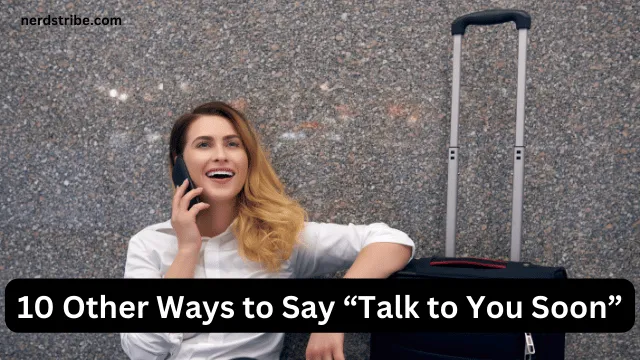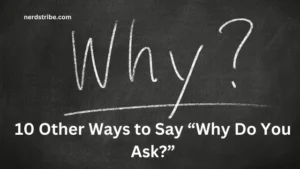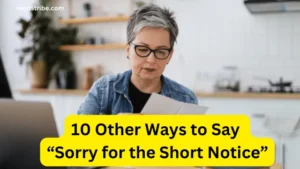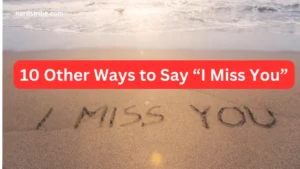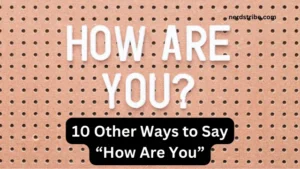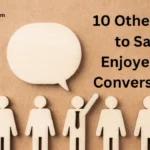Saying “Talk to you soon” is a common way to end a conversation, but have you ever wondered if there are other ways to express the same sentiment? Whether you’re sending a message to a friend, colleague, or loved one, it’s important to mix up your language to keep communication fresh and engaging. Phrases like “Talk to you soon” are comfortable and familiar, but there’s so much more you can say to convey the same warmth and expectation of future communication.
In both personal and professional conversations, the way you sign off can influence how the other person feels about the interaction. By using different expressions, you can tailor your message to the tone of your relationship and even create a more lasting impression. Switching up your phrases can help keep your conversations feeling natural, energetic, and engaging.
This blog post explores 10 other ways to say “Talk to you soon”, offering you new options to express anticipation for future conversations. If you’re tired of the same old sign-off or want to be more creative, keep reading for fresh alternatives that will keep your communication dynamic and engaging.

Contents
- 1 1. “Catch You Later”
- 2 2. “Speak to You Soon”
- 3 3. “See You Soon”
- 4 4. “I’ll Be in Touch”
- 5 5. “Until Next Time”
- 6 6. “Let’s Chat Again Soon”
- 7 7. “Looking Forward to Our Next Chat”
- 8 8. “Talk Soon”
- 9 9. “Stay in Touch”
- 10 10. “I’ll Talk to You Later”
- 11 Conclusion
- 12 FAQs
- 12.1 Can I use “Talk to you soon” in professional emails?
- 12.2 Is “Catch you later” too informal for business communication?
- 12.3 What’s the best sign-off for a close friend?
- 12.4 Should I change my sign-off depending on the person?
- 12.5 Can these alternatives be used in text messages?
- 12.6 What’s a good alternative for a formal email sign-off?
- 12.7
1. “Catch You Later”
A casual and friendly sign-off for informal conversations.
- Example: “Catch you later! Let’s chat soon.”
- Why It Works: It feels laid-back, implying that you’ll reconnect soon without much formality.
2. “Speak to You Soon”
A simple alternative that’s perfect for professional or formal conversations.
- Example: “I’ll speak to you soon regarding the updates.”
- Why It Works: Direct and to the point, yet still conveys a friendly tone.
3. “See You Soon”
A more personal and warm alternative.
- Example: “See you soon, I’m looking forward to it!”
- Why It Works: Often used in in-person interactions, it conveys a sense of excitement and eagerness.
4. “I’ll Be in Touch”
A good choice for professional settings, indicating you’ll reach out soon.
- Example: “I’ll be in touch to finalize the details.”
- Why It Works: It’s professional and suggests that the conversation will continue when the time is right.
5. “Until Next Time”
A nostalgic and slightly poetic way to end a conversation, often used in long-term relationships.
- Example: “Until next time, take care!”
- Why It Works: It feels like a promise, implying there’s more to come in the future.

6. “Let’s Chat Again Soon”
A conversational and inviting way to express anticipation for the next conversation.
- Example: “Let’s chat again soon, I’ve enjoyed this!”
- Why It Works: It’s warm and implies eagerness for future exchanges.
7. “Looking Forward to Our Next Chat”
A more formal way to express your anticipation.
- Example: “Looking forward to our next chat about the project.”
- Why It Works: It conveys professionalism while still keeping things friendly.
8. “Talk Soon”
Short and sweet, this is a simple alternative that gets the message across.
- Example: “Talk soon! I’ll update you then.”
- Why It Works: It’s quick and to the point, without over-complicating things.
9. “Stay in Touch”
A more enduring way to suggest continued communication, suitable for both personal and professional contexts.
- Example: “Stay in touch, and we’ll catch up soon!”
- Why It Works: It implies ongoing communication, making it ideal for networking or personal relationships.
10. “I’ll Talk to You Later”
A common expression that can be used casually or formally.
- Example: “I’ll talk to you later; we’ll pick this up soon.”
- Why It Works: It’s flexible and works in various contexts, signaling the end of the current conversation but implying more to come.
Conclusion
Ending a conversation doesn’t have to be monotonous or predictable. By using one of these 10 alternatives to “Talk to you soon,” you can keep your conversations feeling fresh and meaningful.
Whether you want to be casual, professional, or even poetic, these options offer flexibility to suit different situations. Language is a powerful tool, and how you close a conversation can influence the tone of your relationship, making your future interactions even more enjoyable.
By switching up your sign-offs, you’ll not only avoid sounding repetitive but also show thoughtfulness and creativity. So, the next time you find yourself saying “Talk to you soon,” consider using one of these alternatives to leave a lasting impression.
FAQs
Can I use “Talk to you soon” in professional emails?
Yes, “Talk to you soon” can be used in professional emails, but consider alternatives like “I’ll be in touch” or “Looking forward to our next conversation” for a more polished tone.
Is “Catch you later” too informal for business communication?
Yes, “Catch you later” is best suited for casual conversations. For business settings, opt for phrases like “Speak to you soon” or “I’ll be in touch.”
What’s the best sign-off for a close friend?
For a close friend, “See you soon” or “Catch you later” is perfect, as they convey warmth and a sense of familiarity.
Should I change my sign-off depending on the person?
Yes, adjusting your sign-off based on the relationship helps maintain the right tone—more casual for friends, more professional for colleagues.
Can these alternatives be used in text messages?
Absolutely! These alternatives work great in text messages, depending on how formal or informal you want to sound.
What’s a good alternative for a formal email sign-off?
In formal emails, phrases like “Looking forward to our next conversation” or “I’ll be in touch soon” maintain a professional tone while still expressing anticipation.

